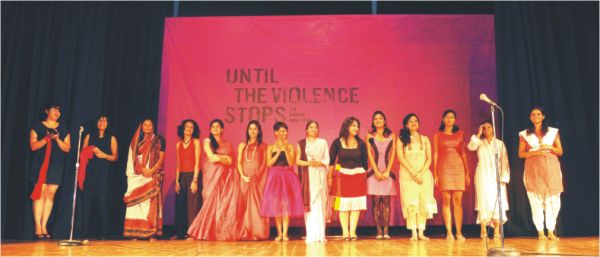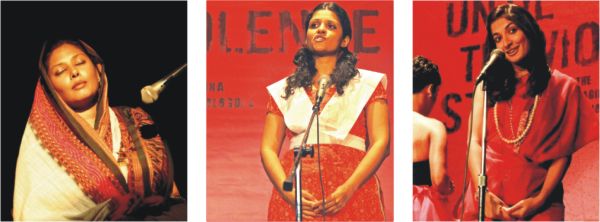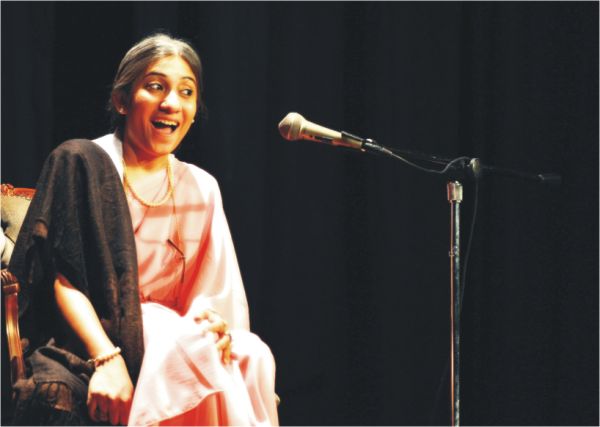Youth in Action

All the actors with the director (on the extreme right). Photo: Shadab Shahrokh Hai
From A Man's diary
Saad Adnan Khan
Let me tell you a little story about my experience with The Vagina Monologues. I had gotten a special edition of the play for my mami, because she is one of those liberal, radical elderlies in the family and I thought she'd enjoy the read. I hadn't read the play, and so I thought that I'd borrow it from her later, once she was done reading. I had seen the play performed at my host university in St Louis, Missouri and I was excited for her to read it. Hardly did I see it coming that after going through it, my mami would shove the book inside her wardrobe, never letting the book see the light of day again.
Anybody who has read the award winning American play is familiar with Eve Ensler's fiercely bold and provocative language that easily makes the readers uncomfortable. The frankness and anger she presents her thoughts with, is something that very few writers offer us. The Vagina Monologues is a series of dramatic monologues by women of different ages from different social, cultural, national, religious and racial backgrounds. The monologues address issues regarding society, culture, religion, gender, sex, sexuality and most importantly women's sex organ- the vagina. According to Ensler, the vagina, which has and still continues to go through violence, degradation and oppression, is a body part that is a source of one's agency and identity, and thus needs exploring, embracing, expressing and loving. The Vagina Monologues are performed worldwide to stop violence against women.
 |
Sadia Rahman, Photo: Tanjila Afrin |
Shekufeh Zonji,
Photo:
Shadab Shahrokh Hai |
Ayeleen Ajane Saleh, Photo: Tanjila Afrin |
This was the third year that the monologues were performed in Dhaka. The monologues were not only about embracing one's sexuality through experiencing and reclaiming true orgasm, but also about the genital mutilation and other kinds of oppressions on women. The monologues took the audiences to villages in African countries, Taliban dominated Afghanistan and the tribal belts in Chittagong Hill Tracts. There were references to Bangladeshi places, words and expressions to situate the monologues in the local context, which was interesting. The audiences shuddered in silence as the actors spoke about rape and also laughed uncontrollably as the actors twitched and made different moans of sexual heightening.
Bangladesh has slowly started to talk, write and perform things that are sensitive, unlike many other Muslim countries. By addressing issues that people do not know how to talk about, and using art as a medium, makes such issues understandable and approachable for people. What will be more exciting is that if shows like these go beyond the limited English speaking audience and reach out to the larger section of educated people. It will make a bigger impact if people started writing about these shows not only in English dailies, but Bengali too. After all, the general masses need to be informed about such important matters.
The Vagina Monologues were performed in North South University, American International School, Dhaka and the Goethe Institut, and attempted to reach the young people. If students start talking about such social issues within their families and circles of friends, it will not be very difficult for people to take an open-minded, liberal stance on subjects like gender, sex and sexuality politics. We cannot deny that such politics influence our public and private spheres. Using the means of education and art can be an effective way to change people's dogmatic way of thinking and acting. American journalist and co-author of 'Half the sky' Nicholas Kristof once said that the fight to stop violence against women is a global fight and men should take part in it too. The show ended on the same note.

Afia Rashid, Photo: Shadab Shahrokh Hai
|
|
|
